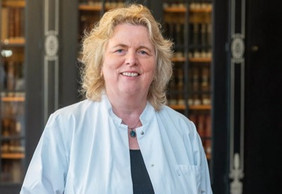An international team of researchers led by Prof. Nadia Harbeck has made a significant advance in breast cancer treatment. The new antibody conjugate "Trastuzumab Deruxtecan" showed promising results in a clinical trial in patients with advanced HER2-positive breast cancer. The treatment significantly extends survival time and offers new hope for patients. The results were published in Nature Medicine.
Patients with so-called advanced HER2-positive breast cancer very often develop metastases in the brain. In this case, their chances of surviving for years are very slim, as previous therapies - surgery and radiotherapy - only help for a short time. Now an international team of researchers co-led by Prof. Nadia Harbeck, Director of the Breast Cancer Centre at LMU Hospital, has tested a new drug in a clinical trial. ‘With fantastic results,’ says the cancer doctor. According to the findings to date, the survival time has been significantly extended. The study results were published in the renowned journal Nature Medicine.
Modern medicine divides breast tumours into different types depending on certain biochemical characteristics of the cancerous tissue. 50 percent of patients with advanced breast cancer and the HER2 tissue characteristic suffer from metastases in the brain, which cannot yet be treated with drugs due to the blood-brain barrier. New drugs are therefore urgently needed.
One of these active substances is an antibody conjugate called "Trastuzumab Deruxtecan". Trastuzumab is an antibody that, once injected into the body, docks precisely to the HER2 protein. It contains the active ingredient deruxtecan, which kills cancer cells and is only active in tumour tissue - and hardly at all in the rest of the body. "This is why we can use this substance at all,’ explains Harbeck, ’otherwise it would be far too toxic."
In order to determine the benefits of the antibody conjugate in HER2-positive breast cancer, the Munich-based physician started the "DESTINY-Breast12 study" as one of the two leaders. Over 500 patients with and without brain metastases from 78 cancer centres in Western Europe, Japan, Australia and the USA took part. The result: on average, the patients survived for over 17 months without their cancer progressing, even with brain metastases. Over 60 per cent of patients survived for twelve months without further tumour growth. In over 70 per cent of the participants, the researchers were able to demonstrate a regression of the cancer in the brain. Ninety per cent of all patients were still alive one year after starting treatment. "These results," says Nadia Harbeck, "give hope to patients with brain metastases in particular." The drug has already been approved for use in standard care.
Overall, the cancer physician attests to the antibody conjugates' “great potential in the treatment of breast tumors.” For example, a large, globally unique study for patients with early, non-metastatic HER2-positive breast cancer has been running in Germany for around a year on the initiative of the West German study group. They are injected with the antibody-conjugate only four times before the surgery, which significantly simplifies and shortens the therapy. A total of three antibody conjugates are currently approved for breast cancer in Germany - “and I think,” explains Harbeck, “that there are many more to come.”
Publication:
Trastuzumab deruxtecan in HER2-positive advanced breast cancer with or without brain metastases: a phase 3b/4 trial
Harbeck, N., Ciruelos, E., Jerusalem, G. et al. Trastuzumab deruxtecan in HER2-positive advanced breast cancer with or without brain metastases: a phase 3b/4 trial. Nat Med (2024).
DOI: https://doi.org/10.1038/s41591-024-03261-7

